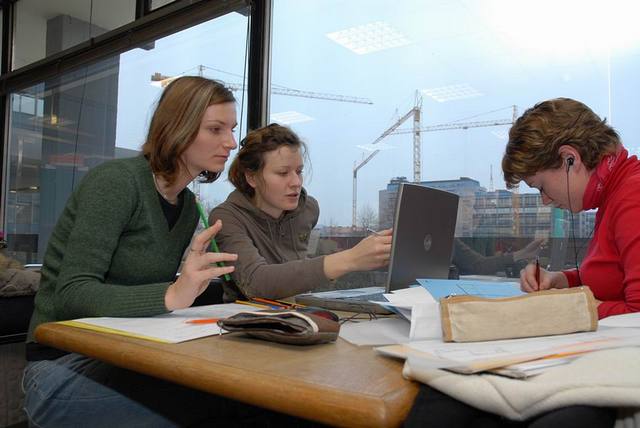Research, Yes, But for What Purpose? “Action Research Training” with Teachers in the Field (Jean-François Cardin)
For the past few years I have been in a very active phase of my career in terms of research. I am currently the principal investigator of three research projects which, although taking an incredible amount of time, give me great satisfaction. This is all the more true since many results of this research are or will be incorporated into my classes for future history teachers with whom I participate closely in their training and who constitute the cornerstone of my work.
For several years I have been interested in the relationship between citizenship education and history teaching, along with other researchers such as Marc-André Éthier, David Lefrançois and Marie-Claude Larouche, who are all well-acquainted with THEN/HiER. In order to coordinate and support this research, we and other colleagues from several Québec universities founded the Groupe de recherche sur l’éducation à la citoyenneté et l’enseignement de l’histoire (GRECEH) (Citizenship Education and History Teaching Research Group). I am also conducting research to better understand the effects of recent curriculum changes in Québec on the practice and professional life of teachers, particularly in history teaching, with colleagues from the Centre de recherche interuniversitaire sur la formation et la profession enseignante (CRIFPE) (Inter-university Research Centre on Teacher Training and the Teaching Profession). Within the sphere of this research I have recently focussed more specifically on my latest research project on concept learning.
In collaboration with educational consultants in the Québec region, this past fall I received a grant from the Québec Ministry of Education to investigate teaching and learning concepts such as “democracy” or “the industrial revolution,” which are at the heart of the new secondary social studies curriculum (history, geography, and citizenship education). From grade one through to the end of secondary school, these concepts are presented according to a logical progression and are the organizing principles for all social studies programs. At the same time, we all recognize that learning them is not easy.
The goal of this project, referred to in university jargon as “Action Research Training,” is for a team of educational consultants to provide support and training strategies to teachers. In its initial stage the project focussed on the upper secondary Histoire et éducation à la citoyenneté (HÉC) (History and Citizenship Education) curriculum, and eventually this expertise was generalized throughout secondary social studies courses. The team of educational consultants had already been working for several years on the problem of concept teaching, notably by the creation of exemplars for teaching and learning to support teachers in the classroom. I joined this team in the winter of 2011.
 The fundamental research question developed from the fact that the consultants found that teachers did not always grasp the progression and role of concepts in the curriculum and they felt ill-equipped to gain a greater understanding of them. We therefore focussed on three objectives: 1) support teachers to become more knowledgeable about the concepts and their role in teaching them to students; 2) to this end, endorse existing requirements and create new ones, and revise teacher and student materials accordingly; 3) develop and implement teacher training on theoretical and practical fundamentals of concept learning in the history and citizenship education curriculum. With the help of a graduate student research assistant, this partnership allowed us to revise requirements that had already been created by educational consultants, endorse them (particularly in regards to their appropriateness to program training objectives), and create others. The overall goal was to provide teachers with a collaborative professional development opportunity to gain the necessary tools for concept teaching and learning while maintaining their individual teaching style.
The fundamental research question developed from the fact that the consultants found that teachers did not always grasp the progression and role of concepts in the curriculum and they felt ill-equipped to gain a greater understanding of them. We therefore focussed on three objectives: 1) support teachers to become more knowledgeable about the concepts and their role in teaching them to students; 2) to this end, endorse existing requirements and create new ones, and revise teacher and student materials accordingly; 3) develop and implement teacher training on theoretical and practical fundamentals of concept learning in the history and citizenship education curriculum. With the help of a graduate student research assistant, this partnership allowed us to revise requirements that had already been created by educational consultants, endorse them (particularly in regards to their appropriateness to program training objectives), and create others. The overall goal was to provide teachers with a collaborative professional development opportunity to gain the necessary tools for concept teaching and learning while maintaining their individual teaching style.
I am especially pleased with the project’s aspect of partnership with teachers within the school environment. There is no denying that we often have a tendency, as university academics, to sit in our ivory towers and hope that teachers will adopt our vision and concept of history teaching, but without getting our own hands dirty. This project is an opportunity for me to learn alongside teachers, taking into consideration their constraints and putting myself in their shoes!

